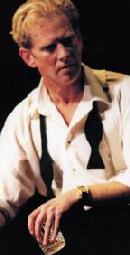SEARCH CurtainUp
REVIEWS
FEATURES
NEWS
Etcetera and
Short Term Listings
LISTINGS
Broadway
Off-Broadway
BOOKS and CDs
OTHER PLACES
Berkshires
London
LA/San Diego
DC
Philadelphia
Elsewhere
QUOTES
On TKTS
LETTERS TO EDITOR
FILM
LINKS
MISCELANEOUS
Free Updates
Masthead
NYC Weather
 London Review
London Review
Don Juan
by Lizzie Loveridge
|
Where there is weakness I shall find opportunity. It is after all the duty of intelligence to thrive on the vices of its own particular century?
--- Don Juan |

James Wilby as Don Juan
(Photo: John Haynes) |
The play opens with strains of Mozart's Don Giovanni, but Bartlett's modern dress version of Don Juan has a resonance which is as true in the twenty-first century as it was in the seventeenth. His theme is hypocrisy, the justification which Don Juan gives for his "love them and leave them"quot; approach, although there are those of us in the audience who can recognise the ambivalent man, the commitment phobic, the man who desires that which he cannot have.
The story is well known and probably medieval in origin. Don Juan (James Wilby), a Spanish nobleman, recklessly seduces women and mocks the dead before being condemned to Hell. De Molina first wrote this in the form of a play in the 1630s in Spanish and Molière picked it up some thirty years later with his version in French which was shelved although not formally censored. Bartlett is interested in the apparent contradictions in the play, the ambiguity and the mixed messages one gets from the main characters. Is Don Juan as much a victim as a predator? Is Sganarelle an abettor or a detractor?
The play opens with Don Juan's servant, Sganarelle (Paul Ritter) commenting on his master Don Juan, telling the audience of the Don's shortcomings. Sganarelle extols the virtues of smoking, how smokers politely share their cigarettes, offering them to each other, anticipating each other's need. It is one of the finest and funniest openings that I have heard in the theatre in a long time. We can understand why this was the part that Molière himself took.
Of course we know that Paul Ritter is an outstandingly talented comedic actor and Bartlett's witty lines are timed to a treat. Paul Ritter's divulging cheeky chappie servant has no illusions about his master while explaining to the audience why he has to carry on working for him. He uses many explicit gestures to illustrate and animate his condemnation of Don Juan and his comedy is given a physical edge. Sganarelle is indignant and upright, a working class moralist over whom the question sits: why does he choose to work for such a shameless man?
By contrast James Wilby's tall, blonde, handsome Don Juan is very, very shallow. He is as slippery as the shine on his patent leather shoes. Like the artist who has yet to paint his best work, Juan describes himself as the lover whose greatest passion is always his next. We see first a ruined woman, a nun seduced by him Donna Elvira (Felicity Dean). Juan turns his attentions to two hotel maids Charlotte (Kirsty Bushell) and Mathurine (Patti Clare) and in a well constructed scene plays both of them simultaneously on stage, convincing each that he loves her and is not interested in the other. The fact that these women are so much lower in class than he is, serves only to show that Juan is interested only in sexual conquest. Having rejected Elvira when she came to remind him of his promise to her, he desires her when she returns repentant and dressed as a nun.
I suppose it is inevitable that it will all end badly. Don Juan listens to no one, not his father, not the disembodied voice of the dead man in the form of a statue and Hell is inevitable. The set is a red, black and gold hotel room, the colours seeming to suggest that Don Juan is already in Hell. Even the potted palms are a glossy back. The statue in polished bronze looks like one of those street acts in Covent Garden who will spin round to startle visitors to the capital.
I most enjoyed Bartlett's jokes, those moments of meta-theatricality when Sganarelle says that the Don's speech sounds like a speech he's learnt from a play, or admires the plasterwork of the Lyric's proscenium arch or when Donna Elvira's veil seems to fly off, he asks the question on all our lips, "How did they do that?" There are lots of other small jokes for the aware, quotes from Shakespeare's Hamlet and the definitive, most wonderfully mixed metaphor and cliché ridden speech from Sganarelle "… a Man, in the midst of this life, is perched no more securely than a bird on a branch; and that branch is of course part of the whole tree; and a branch in time saves nine; and wood is thicker than water; fine words butter no parsnips, and there is no such thing as Society!" Splendid!
| Don Juan
Written by Molière In a new translation by Neil Bartlett Directed by Neil Bartlett Starring: James Wilby and Paul Ritter With: Felicity Dean, Giles Havergal, James Bellorini, Giles Fagan, Kirsty Bushell, Patti Clare, Gregory Cox Designer: Neil Bartlett Lighting Designer: Bruno Poet Sound: Nick Manning Running time: Two hours 15 minutes with one interval Box Office: 08700 500 511 Booking to 30th October 2004 Reviewed by Lizzie Loveridge based on 4th October 2004 performance at the Lyric Theatre Hammersmith, King Street, London W6 (Tube: Hammersmith) |


Mendes at the Donmar
Our Review

Peter Ackroyd's History of London: The Biography

London Sketchbook

Retold by Tina Packer of Shakespeare & Co. Click image to buy.
Our Review

6, 500 Comparative Phrases including 800 Shakespearean Metaphors by CurtainUp's editor.
Click image to buy.
Go here for details and larger image.
